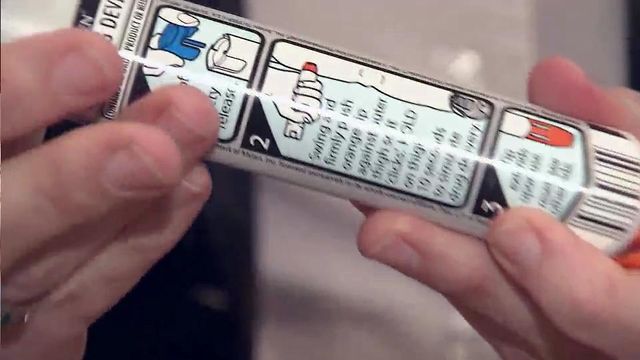EpiPen legislation for NC schools hung up in Senate
A bill that would make epinephrine injectors, commonly known as EpiPens, available in all North Carolina schools remains stalled in the state Senate.
EpiPens are used to treat people suffering severe allergic reactions. Students with prescriptions are allowed to have them, but schools aren't allowed to keep extras on hand for students who don't have a prescription.
The state House passed the legislation unanimously last April, but the Senate refused to take it up before adjourning last summer. Senate leaders wouldn't say Tuesday whether they will vote on the measure when they reconvene in May.
Kendra Montgomery-Blinn, the mother of a 7-year-old with a peanut allergy, told members of the Education Oversight Committee on Tuesday that the law is needed to help her son and other children with potentially fatal allergies.
"If another kid got messy with their peanut butter and jelly sandwich that they packed for lunch, and then they went to the swing-set before my son and touched the swing, and my son then came and sat on that same swing and put his hands in his mouth, as 7-year-olds often do, he could die," Montgomery-Blinn said.
Her son has an EpiPen everywhere he goes, she said, but some children who need them may not. Researchers say about 5% of all children have dangerous allergies, and many may not even know about them – as many as one in four children have their first reaction at school.
"Maybe they're not diagnosed with the allergy yet. Maybe it's the first time they get a bee sting at recess or the first time they eat a cashew during a project in class," she said.
Without EpiPens, all schools can do for anaphylactic shock is call 911. Four students in other states have died waiting for help, according to Dr. Ben Wright, a Duke University researcher, who noted that the number of North Carolina students needing EpiPen injections at school has jumped from 5,000 in 2004 to 13,000 in 2012.
Wright also told the panel that the pens carry minimal danger of side effects in children.
"All of the physician community is supportive, all of the school community is supportive and it's occurring throughout the country," said Rep. Rick Glazier, D-Cumberland, who sponsored the bill.
Some senators at Wednesday's hearing voiced concerns about liability, but Glazier said his bill includes immunity for actions taken in line with school policy. It also includes training for teachers and staff at schools, though many are already trained in the use of the injectors.
Montgomery-Blinn is hopeful the Senate will act this year. "Hopefully we'll get it passed before we ever have a child to name it after, and it'll save lives."
North Carolina is one of just five states without an EpiPen law on the books or pending.
Congress passed a bipartisan law last November that provides federal funding to pay for the injectors if states require schools to have them, and the EpiPen manufacturer already offers free and discounted injectors for schools.











